As with any treatment program, ask your veterinarian questions about the medication he or she prescribes for your dog. It is essential to be extra vigilant to signs of skin infections and illnesses.
What is Atopica?
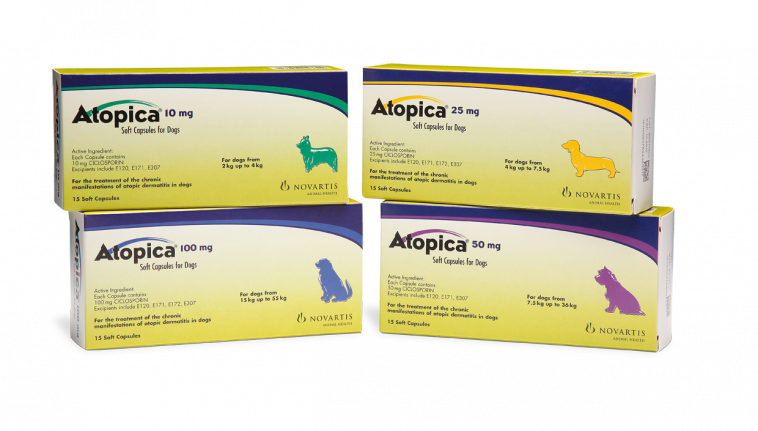
Atopica, also referred to as cyclosporine, is often prescribed for dogs suffering from atopic dermatitis. Atopica is used when steroids like prednisolone don’t work to relieve allergies. It is a mycotoxin that is produced by fungi.
Mycotoxins are toxic secondary metabolites produced by microfungi. Fungi have the capacity to lower the stability of the immune systems of pets and humans. Cyclosporine was first discovered in Switzerland in 1972 and is used today to treat various skin conditions.
A reliable long-term option
Atopica is a useful, non-steroidal option for long-term control of skin conditions in dogs like atopic dermatitis. It is an FDA approved medication and works by controlling skin reactions in dogs. It is easy to use and should be administered every day or as prescribed by your veterinarian.
It assists in preventing hair loss, sleepless nights, gnawing, secondary skin infections, foul skin odors, and excessive scratching. Atopica works by directly influencing the immune cells that are responsible for the allergic reactions causing the itch.
Atopica has had its fair share of issues since it contains the immune modulating cyclosporine. It is only used when all other options have been eliminated, and when it is applied, affects the T-lymphocytes in the immune system, which are involved with the abnormal immune reaction. Atopica can only be prescribed by a veterinarian, and strict adherence to dosage is crucial.
Not to be prescribed in the following instances
Atopica should not be administered when dogs are also getting a vaccination, as there is the risk of an active infection of the disease the dog is being vaccinated against, while on Atopica. It’s also not advised for puppies younger than six months of age, nor pregnant or lactating female dogs.
What’s it used for in dogs?
There is quite a large range of ailments for which Atopica is prescribed, and here we’ll take a look at a couple of the more common afflictions.

Cyclosporine is a powerful immuno-suppressive drug that is used for the treatment of autoimmune diseases and organ transplantation. In dogs, cyclosporine is used to treat a spectrum of chronic inflammatory and immune‐mediated diseases. Cyclosporine was approved by the FDA in 1983 for the treatment and prevention of organ rejection in human transplant cases.
By 2003 Novartis Animal Health received FDA approval to use oral cyclosporine capsules known as Atopica for the treatment of canine atopy. Cyclosporine has been used for many years for renal transplantation in dogs and cats, and for inflammatory and immune-mediated conditions.
Canine Atopic Dermatitis
Dermatitis refers to inflammation of the skin. When this happens in dogs, your veterinarian will require a detailed history, physical examination, and will also run tests to reach a diagnosis.

There are numerous factors to consider!
Genetics may contribute to canine atopic dermatitis. Allergens, fleas, ticks, and mites may also be a contributing factor. Changes in a dog’s environment, the season the inflammation began, the dog’s breed and age will all be taken into consideration during the exam. Excessive bathing with hard water or strong shampoos can also worsen some canine skin conditions.
An immediate diagnosis is not always possible, and several treatment methods will probably be applied. Your vet may also take skin cultures, urine and blood tests, skin scrapings, biopsies, and do a microscopic analysis of skin scrapings with hair. Additionally, your vet may wait and see as to how a particular treatment works before making an final diagnosis.
Different types of skin reactions
The activation of Type 1 and Type 4 hypersensitive reactions are an important factor.
- Type 1 skin reactions in dogs are commonly due to allergies which are referred to as atopic dermatitis.
- Type 4 skin reactions are delayed onset reactions in which T-lymphocytes are the primary mediators.
In these cases, cyclosporine is used as a treatment since it targets the T-lymphocytes in the immune system and is beneficial in treating canine atopic dermatitis.
Keratoconjunctivitis Sicca

This is a condition in which the conjunctivitis becomes dry. It is a chronic bilateral desiccation of the conjunctiva and cornea in dogs, due to not enough tear film. Atopica may be used as a treatment in such cases.
Perineal Fistulas
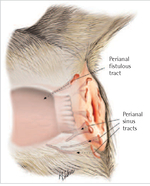
This condition causes tunnels or fissures to develop in the anal area. It is a painful ailment which mostly affects German Shepherds. Your veterinarian may prescribe Atopica for this condition.
Immune- Mediated Hemolytic Anemia
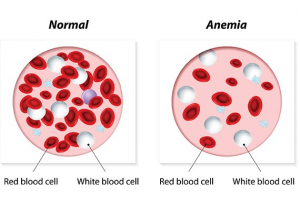
This is a disease where the immune system destroys its own blood cells, and Atopica may be prescribed to get it under control.
Discoid Lupus Erythematosus
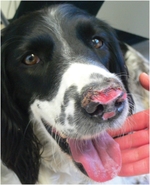
Dogs with this condition will develop crusting and scabbing of the skin. Treatment may include Atopica.
Things to know before administering

Cyclosporine does not mix well with other medicine
According to a 2014 study in the Journal of Veterinary Medicine, cyclosporine is linked to a large number of drug interactions in dogs, that can also affect blood cyclosporine concentrations.
Although in the U.S it is mainly used to treat dogs with atopic dermatitis, there are numerous uses for this drug. “Cyclosporine is an immunomodulatory drug used to treat an increasing spectrum of diseases in dogs.
Cyclosporine is a calcineurin inhibitor, ultimately exerting its inhibitory effects on T‐lymphocytes by decreasing production of cytokines, such as interleukin. Ultra-micronized cyclosporine is available as an approved animal product, and human proprietary and generic preparations are also available. Bioavailability of the different formulations in dogs is likely to vary among the preparations.”
The study also indicates that drug therapy monitoring (DTM) of Atopica is necessary, to keep consistent plasma cyclosporine concentrations regardless of bioavailability and drug interactions, and to ensure successful treatment.
Possible adverse effects of Atopica
Cyclosporine has a high binding affinity for red blood cells and plasma lipoproteins. About 50% of this drug is found in the red blood cells after administration, making the need for whole blood necessary for therapeutic drug monitoring.
After circulation, cyclosporine distributes everywhere from kidneys, liver, skin, and the fat of dogs. Peak concentrations are 2 hours after administration. There are some drug interactions with cyclosporine that will either lead to an increase or decrease of cyclosporine concentrations.
Side effects include
- Nausea
- Vomiting
- Diarrhea
- Appetite loss
- A runny nose
- Coughing
- Urinary problems
- Lethargy
- Lymph node swelling
- Changes in coat health and shine
- Hives
- Fever
Drug interactions
There are numerous drugs that interact with cyclosporine.
That said, it is necessary to discuss with your veterinarian any medications, prescriptions, over-the-counter, or herbal preparations that you are giving to your dog. You will also need to educate yourself on how cyclosporine works, and any possible side effects that this drug may have on your dog.
Cyclosporine is an immunosuppressant and cannot be used on dogs weighing less than 4 pounds. Dosage has to be according to veterinary instructions. The complete list of all drugs that may interact with cyclosporine is available at your veterinarians office.
The list below highlights a few of the drugs that interact with Atopica. It is necessary to discuss all medications that your dog is on with your vet before the administration of a cyclosporine drug like Atopica.
Drugs that should not be used in combination with Atopica
- Cimetidine
- Ranitidine
- Etodolac
- Piroxicam
- Prednisolone
- Methylprednisolone
- Itraconazole
- Erythromycin
- Allopurinol
What to ask your veterinarian
Before prescribing Atopica, your veterinarian will most likely begin by discussing treatment options. They will recommend and advise you about the specific disorder, and the recommended drugs that will be needed to treat the disease.
You and your vet will need to thoroughly discuss any medications, prescriptions, over-the-counter, or herbal products that you are giving your dog. You will also need to inform yourself about how Atopica works, and any possible side effects that this drug may have on your dog.
Most importantly, you will need to prepare yourself in advance should there be any side effects that would need immediate emergency veterinary care. Even if Atopica seems easy enough to use, or you’ve given this to your dog in the past, it’s still important to follow all instructions carefully. Correct dosages must be administered at all times.
What your vet definitely needs to know
Inform your veterinarian if your dog suffers from seizures. Atopica may increase your dog’s susceptibility to infection. Gastrointestinal problems, pregnancy, liver disorders, and kidney disease are among the range of conditions or diseases that will prevent your veterinarian from prescribing Atopica.
There are numerous side effects and drug interactions with Atopica. Gingival hyperplasia and papillomae may occur after giving the initial dose. Dogs with neoplasia should not be given Atopica.
How do I give my dog Atopica?
Atopica has been developed to treat skin allergies in dogs. Sometimes giving medications to dogs can be complicated and demanding. Veterinarians have the legal right to prescribe drugs like Atopica for purposes beyond those for which they have been approved.
Atopica is available in a soft gel capsule that is given orally on an empty stomach an hour or two after a meal. Dosage Tablets come in different strengths such as 10mg, 25mg, 50mg and 100mg. The usual dosage for dogs is 5mg/kg/day as a single dose for one month.
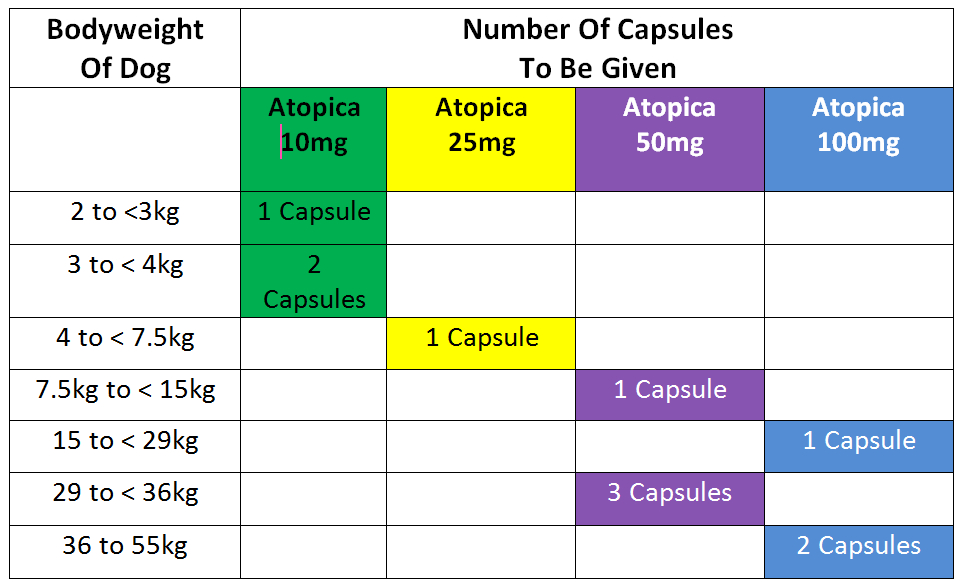
Cyclosporine use may be tapered down after the initial daily treatment to alternate days or twice weekly until a minim frequency is reached that is still is effective.
Missed doses
Never double up on a these meds if you happen to miss a dose.****
What to do in case of overdose
Overdoses of Atopica are serious and it is important that you contact your veterinarian immediately if you suspect an overdose of Atopica.****
Symptoms of an overdose could present as follows:·
- Loss of appetite
- Diarrhea
- Nausea and vomiting
- Increased thirst
- Increased urination
- Lethargy
- Jaundice
Final say on Atopica for dogs

Taking extra time to talk to your veterinarian before the use of Atopica for your dog will allow you to discuss the adverse side effects – should they occur. Additionally, it will enable you to discuss the pros and cons of Atopica use.
While cyclosporine use is relatively safe, it is necessary to be extra cautious when using this drug. There are plenty of drug interactions and also numerous side effects.
Because Atopica is a potent drug which is mainly used to treat atopic dermatitis and affects the immune system of dogs, use of this drug should be strongly considered before administering. Ask your veterinarian about alternative treatments!
